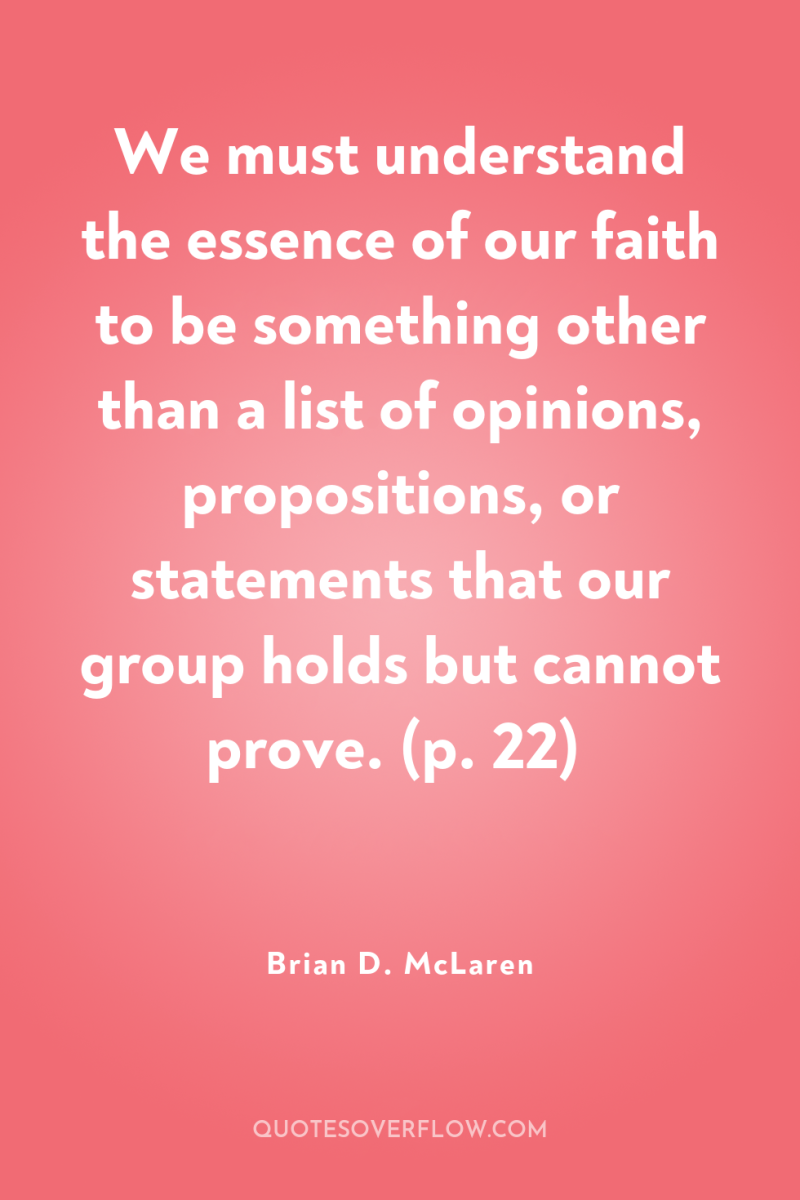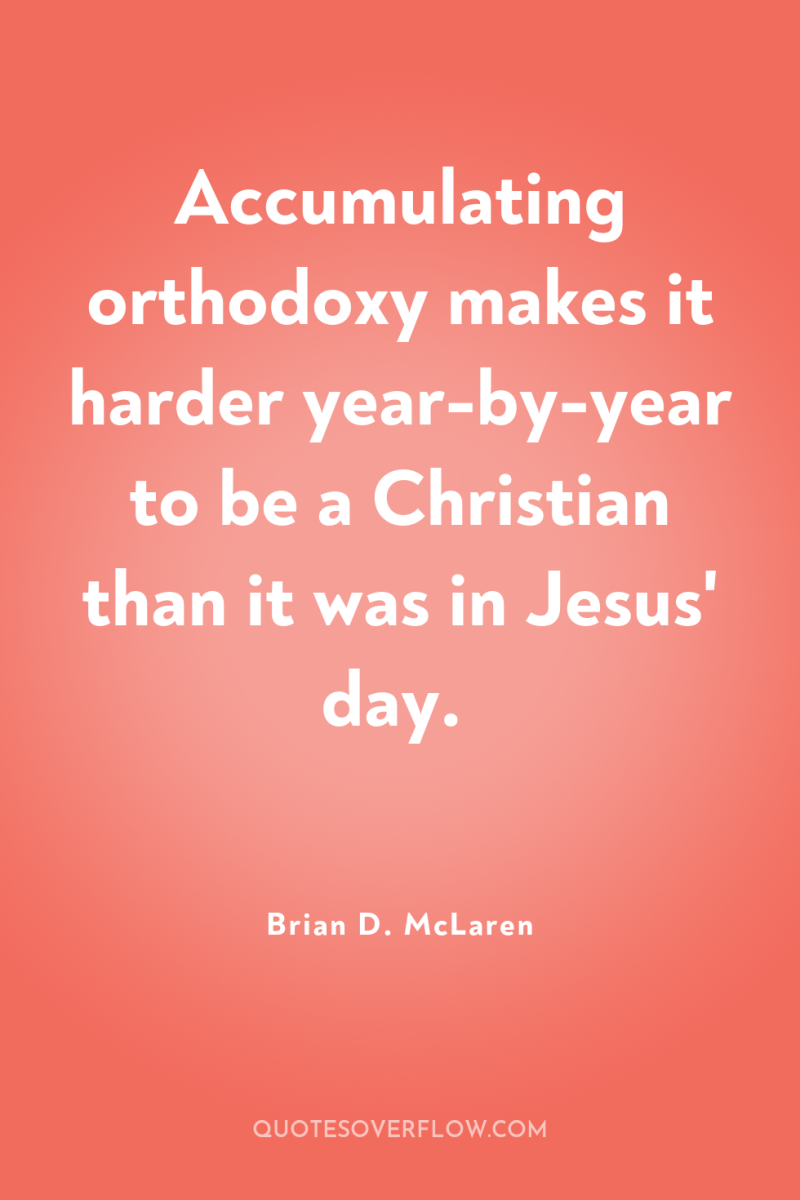
1
We must understand the essence of our faith to be something other than a list of opinions, propositions, or statements that our group holds but cannot prove. (p. 22)Brian D. McLaren
2
I’m sure I am wrong about many things, although I’m not sure exactly which things I’m wrong about. I’m even sure I’m wrong about what I think I’m right about in at least some cases.Brian D. McLaren

3
Accumulating orthodoxy makes it harder year-by-year to be a Christian than it was in Jesus' day.Brian D. McLaren
4
If you love someone, you will want to understand them and accept them as they grow and change; similarly, loving yourself involves a never-ending process of self-understanding and self-acceptance through life's ups and downs..we are finally coming to understand that love for neighbor and love for self naturally lead to love for the earth..if you love your neighbor as yourself, you want both them and you to be able to breathe, so you need to love clean fresh air..you want them and you to be able to drink, so you need to love pure water in all its forms..you want them and you to be be able to eat, so you need to care about the climate.." (p. 59-60) .Brian D. McLaren
5
Oppression theology and supremacist spirituality developed in the belief ecosystem of an angry God who needed appeasement in order to dispense grace, who favored some and disfavored others, and who welcomed the favored into religious institutions that accumulated and hoarded privilege and protected the status quo.Brian D. McLaren
6
If enough individuals are full of despair and anger in their hearts, there will be violence in the streets. If enough individuals are full of greed and fear in their hearts, there will be racism and oppression in society. You can't remove the external social symptoms without treating the corresponding internal personal diseases.. Pope Francis draws our attention to the 'invisible thread' of the market, which he describes as 'the mentality of profit at any price, with no concern for social exclusion or the destruction of nature.' This mentality generates inequality, which in turn generates 'a violence which no police, military, or intelligence resources can control'..changed individuals cross racial, religious, ethnic, class or political boundaries to build friendships. These friendship work like sutures, healing wounds in the social fabric. They 'humanize the other, ' making it harder for groups to stereotype or scapegoat. They create little zones where the beloved community is manifest.. They help people envision the common good--a situation where all are safe, free, and able to thrive. As my friend Shane Claiborne says, our problem isn't that rich people don't care about poor people; it's that all too often, rich people don't know any poor people. Knowing one another makes interpersonal change and reconciliation possible. (p. 167-168) .Brian D. McLaren
7
When our institutions lack movement to propel them forward, the Spirit, I believe, simply moves around them, like a current flowing around a rock in a stream..without that soul work that teaches us to open our deepest selves to God and ground our souls in love, no movement will succeed and no institution will stand..it is the linking of action and contemplation, great work and deep spirituality, that keeps goodness, rightness, beauty, and aliveness flowing..as Pope Francis has said, this moment calls for social poets: sincere and creative people who will rise on the wings of faith to catch the wind of the Spirit, the wind of justice, joy, and peace. (p. 180) .Brian D. McLaren
8
...churches would aim to take people at every age and ability level and help them become the most loving version of themselves possible. They would help people face the challenges of life--challenges that could make them bitter, self-absorbed, callous, or hateful--with openness, courage, and generosity. (p. 54)Brian D. McLaren
9
We’re seeking – imperfectly at every turn, no doubt – an incarnational theology, a theology that brings radical good news of great joy for all the people, good news that God loves the world and didn’t send Jesus to condemn it but to save it, good news that God’s wrath is not merely punitive but restorative, good news that the fire of God’s holiness is not bent on eternal torment but always works to purify and refine, good news that where sin abounds, grace abounds all the more.Brian D. McLaren
10
Growing numbers of us are acknowledging with grief that many forms of supremacy– Christian, white, male, heterosexual, and human–are deeply embedded not just in Christian history, but also in Christian theology. We are coming to see that in hallowed words like almighty, sovereignty, kingdom, dominion, supreme, elect, chosen, clean, remnant, sacrifice, lord, and even God, dangerous vices often lie hidden. We are coming to see in the life and teaching of Christ, and especially in the cross and resurrection of Christ, a radical rejection of dominating supremacy in all its forms. The theological term for [this] is kenosis, which means self-emptying. Rather than seizing, hoarding, and exercising power in the domineering ways of typical kings, conquistadors, and religious leaders, Jesus was consistently empowering others. He descended the ladders and pyramids of influence instead of climbing them upwards, released power instead of grasping at it, and served instead of dominating. He ultimately overturned all conventional understandings of . power by purging [it] of violence–to the point where he himself chose to be killed rather than kill.Brian D. McLaren
11
I have no doubt that Jesus would actually practice the neighborliness he preached rather than following our example of religious supremacy, hostility, fear, isolation, misinformation, exclusion, or demonization.Brian D. McLaren
12
We must not define Jesus and his kingdom by fitting them within conventional understandings of kings and kingdoms. Rather, we must judge and deconstruct those conventional definitions in light of Jesus and his example.Brian D. McLaren
13
If we speak of an angry God at all, we will speak of a God angry at indifference, angry at apathy, angry at racism and violence, angry at inhumanity, angry at waste, angry at destruction, angry at injustice, angry at hostile religious clannishness. That anger is never against us (or them); it is against what is against us (and them).Brian D. McLaren
14
We must never underestimate our power to be wrong when talking about God, when thinking about God, when imagining God, whether in prose or in poetry. A generous orthodoxy, in contrast to the tense, narrow, or controlling orthodoxies of so much of Christian history, doesn't take itself too seriously. It is humble. It doesn't claim too much. It admits it walks with a limp.Brian D. McLaren
15
The Church has little idea how unorthodox it is at any given moment. If a church can't yet be perfectly orthodox, it can, with the Holy Spirit's help and by the grace of God, be perpetually reformable.Brian D. McLaren
16
Politicians compete for the highest offices. Business tycoons scramble for a bigger and bigger piece of the pie. Armies march and scientists study and philosophers philosophise and preachers preach and labourers sweat. But in that silent baby, lying in that humble manger, there pulses more potential power and wisdom and grace and aliveness than all the rest of us can imagine.Brian D. McLaren
17
At their best, religious and spiritual communities help us discover this pure and naked spiritual encounter. At their worst, they simply make us more ashamed, pressuring us to cover up more, pushing us to further enhance our image with the best designer labels and latest spiritual fads, weighing us down with layer upon layer of heavy, uncomfortable, pretentious, well-starched religiosity.Brian D. McLaren
18
You might tell me that you have been engaging in some deep questioning and theological rethinking.1 You can no longer live with the faith you inherited from your parents or constructed earlier in your life. As you sort through your dogma and doctrine, you’ve found yourself praying less, less thrilled about worship, scripture, or church attendance. You’ve been so focused on sorting and purging your theological theories that you’ve lost track of the spiritual practices that sustain an actual relationship with God. You may even wonder if such a thing is possible for someone like you. .Brian D. McLaren
19
In the previous few minutes, I had seen the most beautiful thing that eyes can see: the glory of God shining in the radiance of creation. I had heard the most beautiful thing that ears can hear: friends telling friends that they love one another. And I had felt the most beautiful thing that any heart can ever feel: the love of God and the love of others.Brian D. McLaren
20
This is a book about getting naked–not physically, but spiritually. It’s about stripping away the symbols and status of public religion–the Sunday-dress version people often call “organized religion.” And it’s about attending to the well-being of the soul clothed only in naked human skin.Brian D. McLaren
21
There’s a lot of dirty theology out there, the religious counterpart to dirty politics and dirty business, I suppose. You might call it spiritual pornography–a kind of for-profit exploitative nakedness. It’s found in many of the same places as physical pornography (the Internet and cable TV for starters), and it promises similar things: instant intimacy, fantasy and make-believe, private voyeurism and vicarious experience, communion without commitment. That’s certainly not what we’re after in these pages. No, we’re after a lost treasure as old as the story of the Garden of Eden: the..Brian D. McLaren
22
In religion as in parenthood, uncritical loyalty to our ancestors may implicate us in an injustice against our descendants: imprisoning them in the errors of our ancestors.Brian D. McLaren
23
There's one thing worse than a failed old religion: a naïve and arrogant new one.Brian D. McLaren